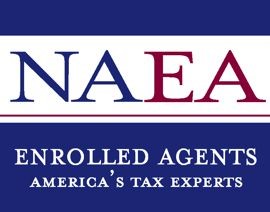Several States Recognize Enrolled Agent Week
The NAEA has been instrumental in many legislative acts recently, designed to protect EAs right to practice. In certain states, EAs were not allowed to advertise their credentials. The NAEA, sent a delegation to Washington and were instrumental in the ...
Feb. 02, 2018

The National Association of Enrolled Agents (NAEA), the organization that supports about 50,000 federally licesensed tax professionals, has announced that about 20 different states have proclaimed the week of February 1 as Enrolled Agent Week. This proclamation from the states, is just another example, of what the NAEA is doing to promote the Enrolled Agent profession.
The NAEA, an organization that I have been a member of since I became an EA, has recently been heavily supporting the EA profession. I have seen FaceBook ads, as well as embedded web advertising, promoting how an EA differentiates from a CPA, or other tax professional.
Enrolled Agents are the only federally licensed tax professionals that have to take a rigorous test to demonstrate their knowledge of tax law, and then are subjected to vigorous background check by the Internal Revenue Service before they are issued their license. To be a member of the NAEA, EAs must complete 30 hours of continuing professional education, with two hours consisting of ethics. The IRS requirements for continuing education for EAs is 15 hours with two hours of ethics.
The NAEA has been instrumental in many legislative acts recently, designed to protect EAs right to practice. In certain states, EAs were not allowed to advertise their credentials. The NAEA, sent a delegation to Washington and were instrumental in the Enrolled Agent Protection Act, not only allows EAs to practice in all 50 states, they are allowed to advertise their credentials.
The states that are observing Enrolled Agents Week, which begins February 1, 2018, should be applauded. The NAEA has worked hard to get the word out there about what an Enrolled Agent is, and how they differentiate from other tax professionals.
Unlike CPAs, all EAs specialize in taxation. The main differences between a CPA and an EA are that CPAs are licensed by the state that they operate in. They are licensed accountants that are able to produce financial statements that are compiled, reviewed, or audited. All three of which are different levels of attestation of the assurance of the numbers on the statements. About 15% of all CPAs specialize in taxation. EAs on the other hand, can produce tax basis financial statements, without attesting to the numbers on the statement. These statements are usually used by EAs to provide tax planning. All EAs specialize in taxation and representation before the IRS.
The important thing is that the NAEA was instrumental in getting 21 states to recognize the first week of tax season as Enrolled Agent Week. Unfortunately, my state is not one of the states participating. However, from memory this is the second or third year in a row that the NAEA has asked states to proclaim either a day or a week for EAs.
The NAEA has done such a good job at advertising, that in the last two or three years, I have gotten calls and emails from potential clients specifically looking for an Enrolled Agent. That is the first time in my 20 years of being an EA that I have received calls and emails, specifically requesting an Enrolled Agent.
I would like to personally applaud the NAEA for their hard work in getting out the word of what an EA is, and how we fit into the accounting landscape. We are now being respected and sought after.
